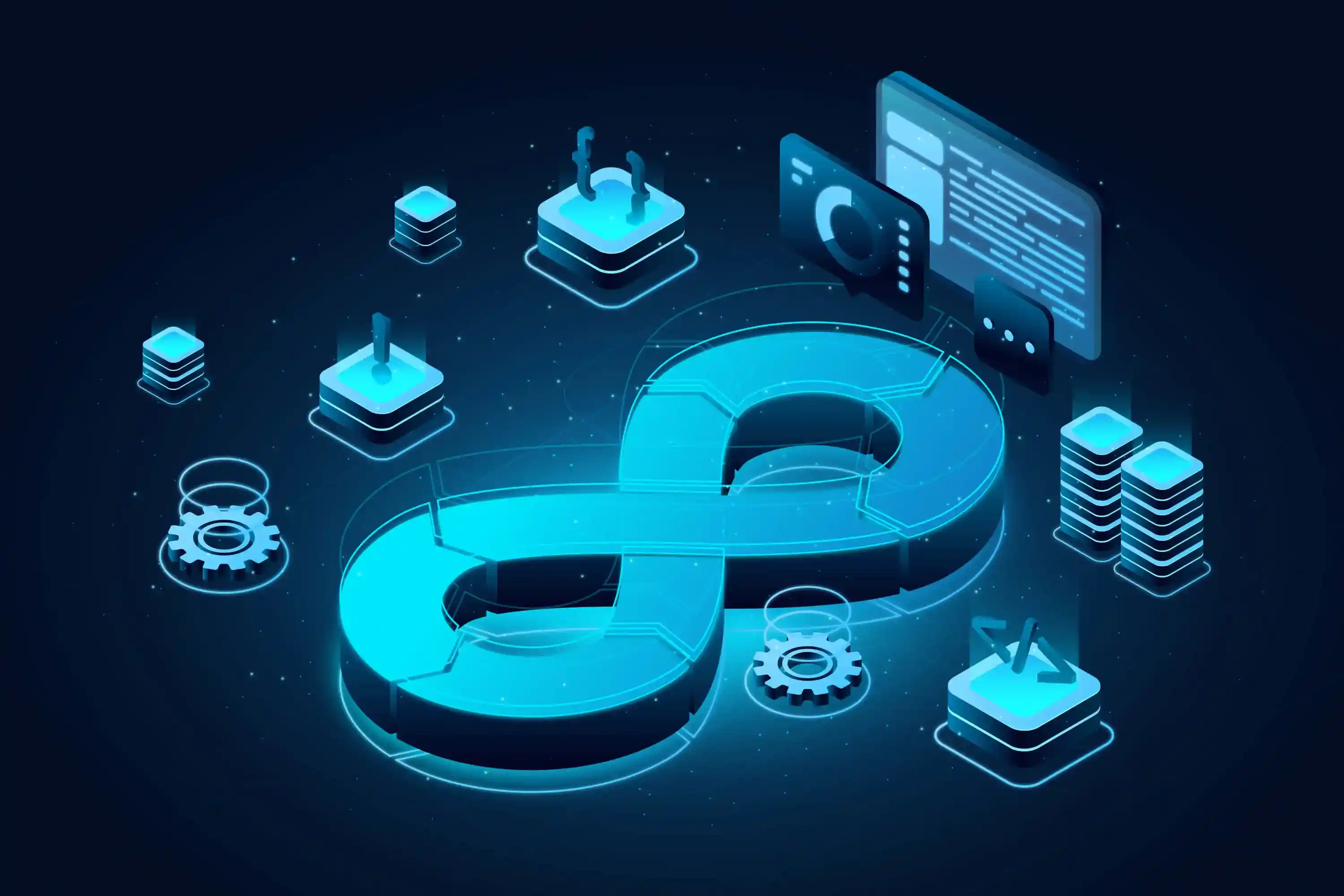DevOps Future In IT Industry!!
DevOps practises are combined by set of Software development & IT operations. It seeks to speed up the systems development life cycle and offer continuous software delivery of the best quality. DevOps engineers play a key role in the DevOps Future in In Industry integration of code, application maintenance, and application administration. DevOps revolves around the unification and automation of processes.
The scope of DevOps in the world is increasing steadily. Even by today’s standards, DevOps shows a very promising future. With the advent of new technological innovations and discoveries, the practical applications that DevOps provide is increasing at a rapid rate. In the IT industry specifically, DevOps have gained a lot of clout and its future in the industry still appears sparkling.
DevOps is a rising industry today, and by 2026, it is predicted that the market would be worth US$287.9 billion.
Source: www.nationalskillsnetwork.in
DevOps specialists can choose from a variety of jobs and responsibilities, including DevOps Engineer, Platform Engineer, Platform Engineer, Building Engineer, etc. The average market rate for a DevOps engineer is an average DevOps engineer makes 6.0 LPA, with salaries ranging from 4.2 lakhs to 12.3 lakhs.
Learning Strategy For DevOps:
First thing to remember that the DevOps learning strategy will include a number of other necessary added skills. Such skills will help you in the long run of your career. These skills include- programming languages such as Python, Ruby, Node.JS, etc., Web Server concepts and software configuration. DevOps skill set also consists of understanding concepts of Linus, as well as OS, such as process management and concurrency.
It will also help you learn about infrastructure as a code and also give you a deeper understanding of version control systems. Management of Servers and monitoring of applications also come under its pursuits. Additionally, it will also help you grow an understanding of Cloud provider systems and services and Cloud patterns at a deeper level.

Infycle will give you the best and required DevOps Training in chennai for you to learn DevOps. In this article, we have highlighted the future of DevOps in a few sectors that fall under the IT industry.
DevOps In The Future Of Security
The concept of security is one of the most important facets that any organisation or company needs to deal with, including in the IT industry. The topic of security is odd since there is a bigger likelihood of automating issues when you automate more. Since all automation in this domain is intrinsically controlled, DevOps concept has a lot of room to grow. The security of the product being developed in Information Technology related environments can be ensured by the DevOps implementation.
This serves as the DevOps philosophy’s governing structure and code of ethics. Security mechanisms that guarantee the integrity of the application and compliance with corporate security guidelines must be ensured through DevOps. DevOps engineers identify potential dangers that the IT system may face and strategize about them in order to secure its security.
Engineering efforts also concentrate on developing systems that are resistant to breaches in order to protect the system from attackers. To protect the system, they spend time coding and doing ongoing security checks. A security development lifecycle (SDL) is monitored and conducted, for example, as well as a number of additional procedures. In a word, Ensuring so keeps the IT industry relatively secure.
Future Of DevOps In AI
DevOps methodology, the cloud-native technique, and microservices architecture have transformed the software development life cycle. Since testing and production environments in the IT sector are integrated via. DevOps, developers can discover issues before programmes are made available to the public. You can perform builds and automation much better with more in-depth knowledge and control by using AI into the DevOps pipelines.
With AI, DevOps is developing and becoming easier for developers, operations personnel, and DevOps engineers. As technology advances, AI is bringing about a revolution in the digital sphere. In that case, the use of a large volume of data by organisations is made possible by artificial intelligence. On the other hand, the scanning can be done for the vast amount of data. The configuration is completed rapidly, minimising the possibility of human error, which lowers costs and boosts productivity.
The use of AI in DevOps can be seen in quality control, monitoring the development of an application, enhancing the security of productions, early danger detection through the use of processes or algorithms to avoid process harm, and many other applications. For you to learn DevOps, Infycle will provide the best and essential training.
Future Of DevOps In Automation
Everything takes place online in the modern age. The majority of businesses are becoming IT businesses that offer specific services. The crucial component that generates sales and business for every firm is its software. In light of this, automation of software deployment and infrastructure provisioning is crucial for all modern enterprises. For this reason, it is essential for increasing productivity and producing the top software.
Thus, Contemporary businesses are now widely using DevOps approaches. Companies are increasingly focusing on automating software processes since it has various benefits, including a decrease in errors. By the time, there are many opportunities for human error in manual operation. And those opportunities might cause the process to be slowed down when time, money, or resources are being used inefficiently.
Automation, however, narrows the potential mistake window while saving time, money, and effort. It also makes efficient use of the team’s resources, which ultimately boosts production. As a result of automation, development and operations teams now have more feedback loops. This function makes it possible to release new features more quickly, improving the quality.
Future Of DevOps In Serverless Computing
The large capital and operating expenditures of server infrastructure will lead to a surge in the use of Serverless architecture in DevOps. Within the IT sector, working with modular components, many DevOps teams are providing a pipeline overview. By switching from pipeline design to Serverless architecture, groups will be able to reduce some of the tasks that were associated with these modular components and concentrate on product development and deployment.

The entire software life cycle, from creation through deployment, testing, and maintenance in one location, is made simpler by Serverless computing, which also streamlines other DevOps procedures. Additionally, server maintenance tasks like cloud monitoring and system updates are handled by Serverless computing, which lessens the developer’s effort. As a matter of fact, flexibility, dependability, quickness, and cost-effectiveness are further key operations.
To accomplish substantial IT transformations that actively support the company’s objectives and objectives, DevOps continues to change and evolve. It will help to improve the business’s capacity to create, produce, introduce, and manage high-quality software solutions. Such developments will positively affect firms in moving past automation and focusing on an increased rate of growing results.
Similar trends often spark the setting up of a viable release pipeline and improved communication processes between various teams dealing with development, business and IT. Infycle will provide you with the required knowledge and the essential training for you to engage and learn DevOps.
Therefore, we can see that DevOps has a very bright future in the IT sector with and thus, many more businesses have shown inclination to adopt this approach. With the introduction of new tools and technology, DevOps techniques are also changing. However, all such changes have mostly been of positive effects. Therefore, the future of DevOps in the IT sectors appears extremely promising.
Conclusion:
In this article, we have highlighted a few categories under the IT industry, and the probable future of DevOps in those specific sectors. In addition to this, DevOps have a huge amount of contribution to a number of other sectors under the IT industry. As I have said, the IT industry is not the only industry that applies DevOps in its working. In other words, DevOps has a wide sway, and may be utilised by different industries for development.
Still, we sought to hold up a few of the most visible practices of DevOps. And its applicability to those specific practices in the future. Overall, the vision is a positive one with a practical outlook. Therefore, we can conclude that DevOps does have a future in the IT industry, which will hopefully be both constructive and officious.





